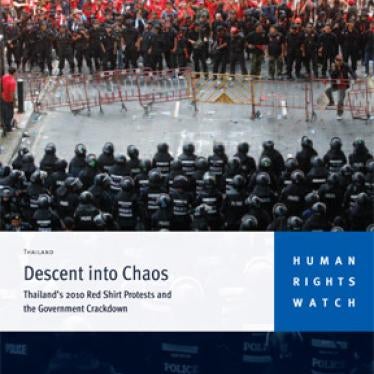(New York) – The Thai government should order the army commander-in-chief to cease interfering in the criminal investigations of the 2010 political violence. The army chief, Gen. Prayuth Chan-ocha, should also stop trying to intimidate critics by filing criminal defamation cases.
On August 16, 2012, Prayuth told the Justice Ministry’s Department of Special Investigation to stop accusing soldiers of killing demonstrators during the government’s crackdown on the “Red Shirt” protest in 2010 and not to report publicly on the progress of its investigations. Prayuth has denied any army abuses during the violence in which at least 98 people died and more than 2,000 were injured, despite numerous accounts by witnesses and other evidence.
Prayuth is also using Thailand’s archaic criminal defamation law to deter public criticism, Human Rights Watch said. On August 17, Prayuth ordered an army legal officer to file a criminal defamation complaint against Robert Amsterdam, a lawyer representing the United Front for Democracy against Dictatorship (UDD) and exiled former Prime Minister Thaksin Shinawatra, and Amsterdam’s translator. At a UDD rally on May 19, Amsterdam gave a speech in which he alleged that the army committed brutality against demonstrators for which it should be held accountable.
“Abuses by soldiers took place in full view of the Thai public and the world’s media, yet the Thai army chief is now trying to intimidate investigators and critics into silence,” said Brad Adams, Asia director. “The government should prosecute all those responsible for crimes during the 2010 violence, including members of the military, who should not be above the law.”
Not one soldier or official has been held accountable for the 2010 violence as criminal investigations have progressed very slowly. Of the 98 known deaths, the Department of Special Investigations and the police have sent 19 cases – believed mostly to be deaths caused by soldiers – to the prosecutor for post-mortem inquests. On August 14, the special investigations department deputy chief, Prawet Moolpramuk, said in a media interview that the agency was planning to question soldiers seen in video footage that also showed military snipers in action near Bangkok’s Lumphini Boxing Stadium.
In response, Prayuth said that soldiers did not kill anyone during the confrontations. He also asserted that soldiers seen in photographs and video armed with telescopic rifles were not “snipers,” but were only using their weapons for self-defense. However, a document signed by then-deputy Prime Minister Suthep Thaugsuban on April 18, 2010, which Human Rights Watch has seen, authorized the deployment of sharpshooters and snipers to more broadly “protect security forces and the public.”
“It is ludicrous for the army chief to claim that the army did not deploy snipers who fired on civilians,” said Adams. “Instead of going after critics, he should be ensuring accountability within his ranks.”
Human Rights Watch expressed concern that the government of Prime Minister Yingluck Shinawatra appears to have sided with the military over its Justice Ministry. Rather than order Prayuth to end his interference in the criminal investigations, Deputy Prime Minister Chalerm Yubamrung said on August 16 that he had ordered the Special Investigations Department chief, Tarit Pengdith, to apologize to Prayuth and to stop talking publicly about its ongoing investigations. Chalerm also announced that soldiers would be treated as witnesses in the investigations and that they would be fully protected from criminal prosecution.
Families of UDD members killed during the violence told Human Rights Watch that they had little hope for obtaining justice for their loss. To receive financial reparations from the government, the families had to sign a settlement forfeiting their rights to file a court case against the army for civil damage.
“Prime Minister Yingluck came to power promising justice to the victims of political violence,” Adams said. “By siding with the army chief in his attempts to shut down investigations into army abuses, she is breaking her promise to the victims and the Thai people.”
From March to May 2010, the UDD, known as the “Red Shirts,” held mass protests against the government of then-Prime Minister Abhisit Vejjajiva. A Human Rights Watch report in May 2011, “Descent into Chaos: Thailand’s 2010 Red Shirt Protests and the Government Crackdown,” concluded that the high death toll and injuries resulted from excessive and unnecessary lethal force by the Thai army and other security forces. The high number of civilian casualties – including unarmed demonstrators, volunteer medics, reporters, photographers, and bystanders – resulted in part from the government’s designation of “live fire zones” around the UDD protest sites in Bangkok.
Armed elements of the UDD, including heavily armed “Black Shirt” militants, were responsible for deadly attacks on soldiers, police, and civilians. Some UDD leaders incited violence with inflammatory speeches to demonstrators, including urging their supporters to carry out riots, arson attacks, and looting. Arson attacks in and outside Bangkok caused billions of dollars in damage.







